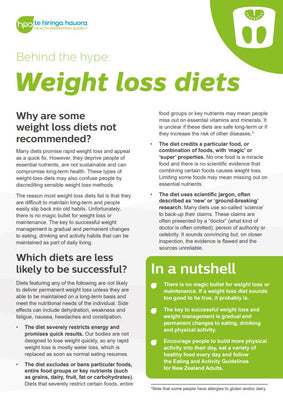Behind the hype: Weight loss diets - NPA162

The two-page Behind the Hype information sheets contain evidence-based advice to help you provide clear consistent information to consumers. Many of the latest diet trends promise fast and easy weight loss. This information sheet provides a list of "red-flag" diet characteristics to avoid and gives evidence-based advice on what to tell people wanting to lose weight.
The full resource:
Behind the hype: Weight loss diets
In a nutshell
-
There is no magic bullet for weight loss or maintenance. If a weight loss diet sounds too good to be true, it probably is.
-
The key to successful weight loss and weight management is gradual and permanent changes to eating, drinking and physical activity.
-
Encourage people to build more physical activity into their day, eat a variety of healthy food every day and follow the Eating and Activity Guidelines for New Zealand Adults.
Why are some weight loss diets not recommended?
Many diets promise rapid weight loss and appeal as a quick fix. However, they deprive people of essential nutrients, are not sustainable and can compromise long-term health. These types of weight-loss diets may also confuse people by discrediting sensible weight loss methods.
The reason most weight loss diets fail is that they are difficult to maintain long-term and people easily slip back into old habits. Unfortunately, there is no magic bullet for weight loss or maintenance. The key to successful weight management is gradual and permanent changes to eating, drinking and activity habits that can be maintained as part of daily living.
Which diets are less likely to be successful?
Diets featuring any of the following are not likely to deliver permanent weight loss unless they are able to be maintained on a long-term basis and meet the nutritional needs of the individual. Side effects can include dehydration, weakness and fatigue, nausea, headaches and constipation.
- The diet severely restricts energy and promises quick results. Our bodies are not designed to lose weight quickly, so any rapid weight loss is mostly water loss, which is replaced as soon as normal eating resumes.
- The diet excludes or bans particular foods, entire food groups or key nutrients (such as grains, dairy, fruit, fat or carbohydrates). Diets that severely restrict certain foods, entire food groups or key nutrients may mean people miss out on essential vitamins and minerals. It is unclear if these diets are safe long-term or if they increase the risk of other diseases.*
- The diet credits a particular food, or combination of foods, with ‘magic’ or ‘super’ properties. No one food is a miracle food and there is no scientific evidence that combining certain foods causes weight loss. Limiting some foods may mean missing out on essential nutrients.
- The diet uses scientific jargon, often described as ‘new’ or ‘ground-breaking’ research. Many diets use so-called ‘science’ to back-up their claims. These claims are often presented by a “doctor” (what kind of doctor is often omitted), person of authority or celebrity. It sounds convincing but, on closer inspection, the evidence is flawed and the sources unreliable.
- The diet promotes or sells a product, such as meal replacement drinks, food bars, pills or powders. Some of these products claim to suppress appetite, speed up metabolism, or block the absorption of fats or carbohydrates. These products are usually expensive and have no reliable scientific evidence that they work.
- The promoters make claims that sound too good to be true, such as ‘eat lots of high-fat foods and lose weight,’ or ‘lose weight while sleeping,’ or ‘lose more than a kilo a day’. If the claim sounds too good to be true, it usually is.
- The diet is recommended as a short-term solution, with promoters telling people to follow it for a specific number of days, weeks or months. Like the weight loss, the associated health benefits are likely to be temporary.
*Note that some people have allergies to gluten and/or dairy.
Best ways to lose weight – what should you tell people?
Encourage people to make permanent lifestyle changes. These can be small changes to start with.
Help people set realistic goals for eating, drinking and physical activity.
Emphasise the health benefits (both physical and mental) of healthy eating and being more active.
Adding physical activity to daily lifestyle can increase weight loss and enhance weight maintenance.
Recognise that maintaining current weight (ie, not gaining weight) has benefits too and that significant health improvements can be achieved with even a 5 to 10% decrease in body weight.
Encourage people to eat a variety of healthy food every day, and follow the Eating and Activity Guidelines for New Zealand Adults.
Encourage people to build more activity into every day, and help them view movement as an opportunity, not an inconvenience. For weight loss, 300 minutes of moderate intensity physical activity is recommended per week. This equates to 60 minutes daily at least five days a week.
Weight loss diets are not usually recommended for children and pregnant women except under medical supervision.
More information
Eating and Activity Guidelines for New Zealand Adults: health.govt.nz/our-work/eating-and-activity-guidelines
Eating and Activity Guidelines for New Zealand Adults: Topical Questions and Answers: health.govt.nz/system/files/documents/publications/ eag-topical-qa.pdf
Resources on eating and activity for the public: health.govt.nz/our-work/eating-and-activity-guidelines/resources-eating-and-activity-public
Weight management section of Health Improvement and Innovation Resource Centre website: weightmanagement.hiirc.org.nz/
Food and Nutrition Guidelines for Healthy Children and Young People (Aged 2–18 years): A background paper: health.govt.nz/publication/ food-and-nutrition-guidelines-healthy-children-and-young-people-aged-2-18-years-background-paper
This resource is for digital download only.